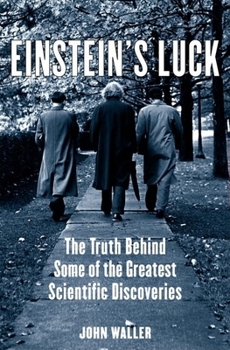Einstein's Luck: The Truth Behind Some of the Greatest Scientific Discoveries
Select Format
Select Condition 
Book Overview
As John Waller shows in Einstein's Luck, many of our greatest scientists were less than honest about their experimental data. Some were not above using friends in high places to help get their ideas accepted. And some owe their immortality not to any unique discovery but to a combination of astonishing effrontery and their skills as self-promoters.
Here is a catalog of myths debunked and icons shattered. We discover that Louis Pasteur was not...
Format:Hardcover
Language:English
ISBN:0198607199
ISBN13:9780198607199
Release Date:May 2003
Publisher:Oxford University Press, USA
Length:308 Pages
Weight:1.60 lbs.
Dimensions:1.1" x 9.3" x 6.4"
Customer Reviews
5 ratings
A monument to the unknown scientist
Published by Thriftbooks.com User , 18 years ago
By showing the truth behind some of the most famous discoveries in the history of science, John Waller pays a tribute to the countless unknown hardworking people who made these discoveries possible. In this well-documented and highly entertaining book, the reader is repeatedly shown that: 1) science seldom progresses through the sudden insights of geniuses, but is a continuous process; 2) as in other fields of human activity, some scientists got a credit they did not deserve, while others were unjustly ignored. This book is a must to everybody who is interested in the history and the ethics of science.
An amazing debunking: our historians, flunking.
Published by Thriftbooks.com User , 18 years ago
John Waller was never born and does not exist: the public has been consistently misled to believe that he wrote a wonderful debunking of some of the greatest stories in scientific history. This is a scrupulously careful and detailed dismantling and burial of some the oldest fairytales in science. Lister's surgery was filthy and dangerous. Shock! Eddington's observations of the eclipse over West Africa in 1919, which supposedly proved Einstein's theory, were worthless. Horror! The removal of the Broad Street pump probably had no effect on the local cholera epidemic. I'm going to be sick! It's painful to discover that the guiding stories of one's lifetime are nonsense, but sometimes it just has to be done. This book has done it to me. John, you've broken my heart, but I've come through it stronger and wiser. Alas, I now see the old wives' tales everywhere, so I spend my days shuddering and shaking my head. As the motto of 'The X-Files' put it: Trust No-One.
Interesting and mostly good
Published by Thriftbooks.com User , 20 years ago
This book is a refreshing egalitarian change from the kind of history that implies that a handful of geniuses are responsible for most scientific progress. It shows that many famous people were less innovative than is commonly thought, and that science is more incremental than revolutionary (but in spite of the title, it says little about Einstein). But I can't help wondering whether the book exaggerates to make the misleading histories sound more scandalous than they really were. However, I only see one sentence that seems to justify this suspicion. On page 94 (regarding the effects of the great depression on the Hawthorne studies) he says "the desperation in these words seems to leap from the page". I don't see any clear signs of desperation in those words he quotes. It wouldn't surprise me if the workers were desperate, but the book fails to convince me about this.
My discovery
Published by Thriftbooks.com User , 20 years ago
What I like about this book, is that not only is it engaging and a good read, but it actually makes me feel clever! With interesting stories written in highly accessible language, the author doesn't condescend to his reader nor talk over his head. A true teacher, he reveals, explains and encourages, enticing you to read on first, and then continue to make more discoveries of your own by thinking about the implications of what he says.Wish we had more authors and teachers out there like this!
illuminating historical insights
Published by Thriftbooks.com User , 20 years ago
If this is science history, it's a pity so few professors can write it. This thought-provoking and enjoyable book reads like a series of detective stories while challenging any simplistic assumptions of the past. We learn that some accepted "proofs" proved nothing at all and that we mistakenly label as revolutionaries men who were truly typical of their time. Dr. Joseph Lister, for examples, whose name is eponymous with antiseptic, managed to exceed the death toll of his colleagues because of his own lack of sanitary standards. Gregor Mendel made important contributions to knowledge but by his own beliefs and theories he was no Mendelian. Charles Darwin followed the tradition of his age in believing in the inheritability of acquired characteristics. And we have pioneers like Robert Millikan and Arthur Eddington who made data fit a chosen theory, rather than the other way around.Yet, far from belittling such men, this book shows them in a new and more human light that transforms our understanding of scientific discovery. John Waller's book is an entertaining read for the layman and an essential read for the scientist or historian.




